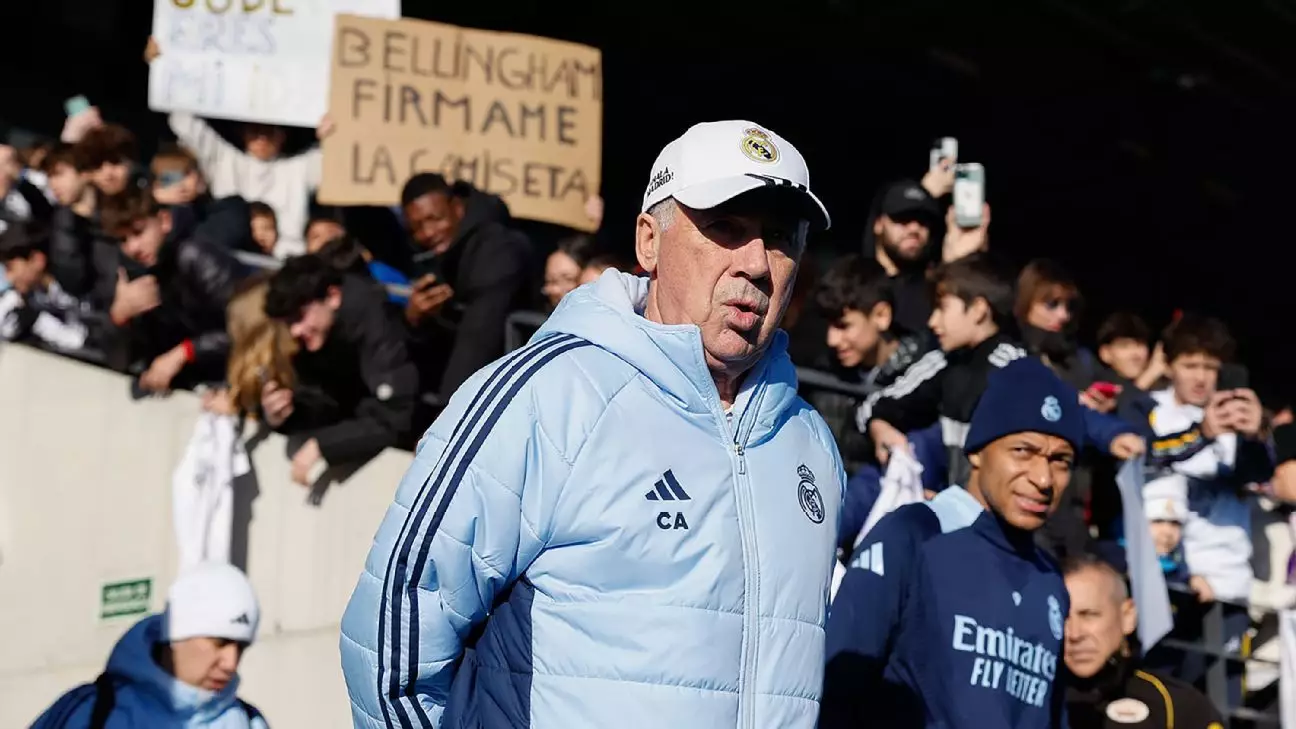The January transfer window is often a double-edged sword for football clubs, particularly for a prestigious organization like Real Madrid. Head coach Carlo Ancelotti recently faced scrutiny after his club’s unsuccessful pursuit of Liverpool’s Trent Alexander-Arnold. Although Madrid has a notorious reputation for their ability to attract world-class players, Ancelotti’s reticent nature towards transfer market discussions indicates a strategic approach. It reflects a balance between recognizing the urgency for reinforcements and fostering the morale of his current squad amid challenging circumstances, notably the serious injury to first-choice right-back Dani Carvajal.
Ancelotti’s dilemma is amplified by the chaotic shifts within LaLiga this season, which have left Real Madrid navigating through injuries while attempting to maintain competitive momentum. Carvajal’s long-term absence has resulted in a palpable need for a capable replacement, portraying the club’s vulnerable state in defense. Ancelotti’s non-committal remarks—“we’ll see” being his go-to phrase—imply a deeper philosophical approach towards team management; he understands the emotional and psychological implications that abrupt changes can impose on group dynamics.
Injuries can derail even the most meticulously constructed plans in professional sports. Madrid has faced a torrent of injuries this season, disrupting Ancelotti’s selection and overall game strategy. Even amidst such adversity, Ancelotti acknowledges the seasoned resilience of his squad. With players like David Alaba returning to training, there is an optimistic undercurrent within the team. The upcoming matches, including the essential clash against Valencia, represent a pivotal moment where positivity and motivation could translate into tangible results on the pitch.
This dynamic pits Madrid in a precarious position; not only are they competing against Atlético Madrid and the resurgent Barcelona, who have faced their own dip in form, but they must also do so with a roster that has been stretched thin. Ancelotti’s assertion that Madrid will need fewer points to contend for the title reflects an increased competitiveness in the league, but it also shows the unpredictability that could shake the standings. The question looms as to whether Madrid can muster the necessary intensity to overtake their rivals without bolstering their ranks.
For a club as storied as Real Madrid, the pressure to perform is always monumental. Ancelotti has emphasized maintaining a “good atmosphere” within the dressing room, highlighting the importance of team morale amidst uncertainties. His choice to focus on winning games rather than engaging in media speculation reflects a leader intent on shieldingin his players from external distractions that could undermine their mental fortitude.
Furthermore, the transfer talk surrounding top-tier players like Alexander-Arnold adds layers of complexity to the already intense situation. Ancelotti’s diplomatic stance on transfer negotiations reveals the respect he holds for rival clubs’ decisions and the overarching structure of football diplomacy. Rather than outright criticism of Barcelona’s issues with player registration, Ancelotti opted for a measured approach, suggesting that every club has its struggles.
As the January transfer window looms, Real Madrid’s strategy appears to hinge less on immediate acquisitions and more on resilience within. Ancelotti remains optimistic about the potential of his existing roster, which has repeatedly shown an ability to adapt and overcome challenges. “We have to maintain that good atmosphere, and we can only do that by winning games,” he stated, encapsulating the essence of his management philosophy.
Real Madrid stands at a crossroads, balancing external expectations against internal cohesion. While the echoes of transfer speculation swirl around Ancelotti, the historical prowess of the club suggests that focusing on the present—with tangible on-pitch successes—may ultimately yield the most fruitful long-term results.

